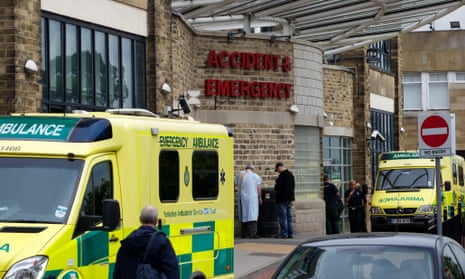Some patients are being forced to wait in ambulances outside hospitals for hours because accident and emergency departments are too busy to take them, research has found.
In one case, a patient in Wales was made to wait more than six hours before being admitted, while another in England was delayed for more than five hours, the BBC found.
NHS guidance recommends that patients should wait in ambulances for no longer than 15 minutes, and delays of more than 30 minutes in England can lead to fines.
Paramedics are allowed to hand patients over to hospitals only when staff there can take charge of them.
The figures were released to the BBC under the Freedom of Information Act after it asked all UK ambulance services for their longest waits for the 12 weeks from August to October.
Dr Clifford Mann, president of the College of Emergency Medicine, said the figures were "alarming".
He told the BBC: "There's always going to be a small number of patients whose transfer is delayed, but not to the extent of these figures – which are approaching three, four, sometimes six hours.
"And remember, these figures relate to the three months up until October. They don't include the really pressured time of the winter and so it's unlikely these figures are going to improve – and that must be a cause for concern."
The longest delay, of a patient waiting six hours and 22 minutes, occurred in Wales. Each weekly maximum wait there for the period was more than three hours.
In the east of England, one patient was forced to wait five hours and 51 minutes, while Scotland had the best record, with none of the weekly maximum waits longer than two hours.
Northern Ireland and the Isle of Wight failed to provide data, the BBC said.
The deputy chief executive of NHS England, Barbara Hakin, said there were 4,476 delays of more than 30 minutes in handing patients on from ambulances last week, down by nearly 1,000 on the same week in 2012.
But she conceded that ambulance services were under pressure.
"NHS England recognises it is essential ambulances are back on the road as soon as possible after taking patients to A&E, though we know it is sometimes in the best interests of patients' safety that they remain in the ambulance after they have arrived at the hospital," she said.
Hakin said NHS England had allocated an extra £14m for extra staff and equipment over the winter months.

Comments (…)
Sign in or create your Guardian account to join the discussion